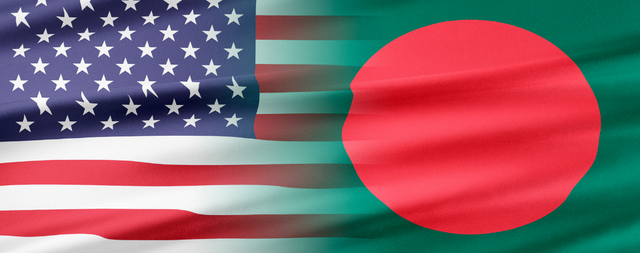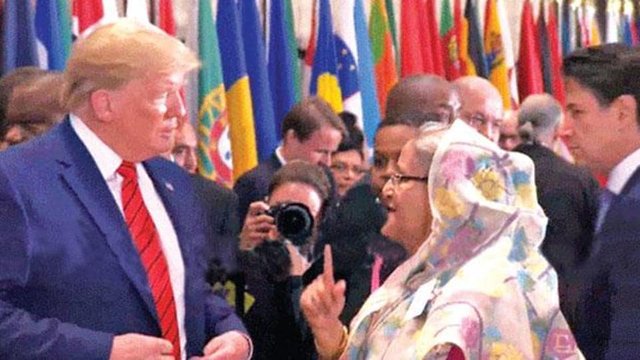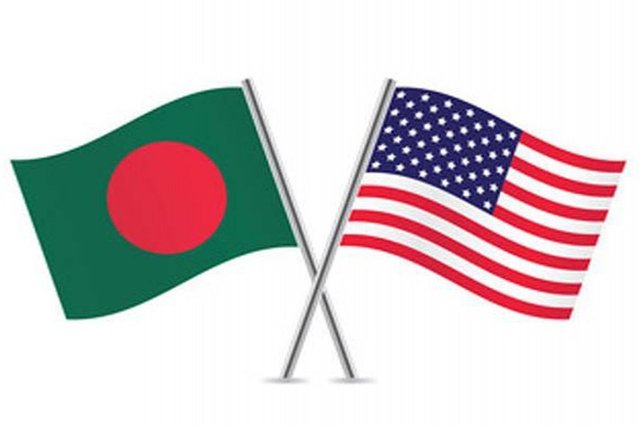Bangladesh-USA bilateral relations.
Abstract
Bangladesh (former East Pakistan) is a Muslim-majority nation in South Asia, bordering India, Burma, and the Bay of Bengal. It is the world’s eighth-most populous country with nearly 160 million people living in a land area about the size of Iowa. It is an economically poor nation, and it suffers from high levels of corruption. In recent years, its democratic system has faced an array of challenges, including political violence, weak governance, poverty, demographic and environmental strains, and Islamist militancy. The United States has a long-standing and supportive relationship with Bangladesh, and it views Bangladesh as a moderate voice in the Islamic world. In relations with Dhaka, Bangladesh’s capital, the U.S. government, along with Members of Congress, has focused on a range of issues, especially those relating to economic development, humanitarian concerns, labor rights, human rights, good governance, and counterterrorism. Bangladesh likely will face a range of other challenges, particularly related to its population growth, population density, and environmental degradation—which many experts believe likely will be exacerbated by climate change. Some experts project that millions could be displaced by climate change in the future. In recent years, Rohingya refugees from Burma have fled to Bangladesh to escape persecution. This movement escalated dramatically between August and September 2017 when violence in Burma’s Rakhine State led to a new surge of over half a million Rohingya refugees crossing the border into Bangladesh. Much international attention has focused on working conditions in Bangladesh. The country plays a significant role in the global textile industry supply chain. In 2016, Bangladesh’s garment sector accounted for over 80% (or about $25 billion) of the country’s exports. About $5.3 billion of those exports went to the United States. However, the industry has come under increased scrutiny, particularly following the 2013 Rana Plaza factory collapse, which killed over 1,000 workers.
Introduction
The United States and Bangladesh have generally enjoyed a positive working relationship. The United States has sought to help Bangladesh with its development goals, including in the areas of sustainable development, health, education, poverty reduction, disaster preparedness, and food security. In recent years, the rise of Islamist militancy has been a cause of concern to the United States and to Bangladesh’s Prime Minister, Sheikh Hasina, and her government. The two nations hold an annual Partnership Dialogue and a Security Dialogue and have developed a cooperative relationship over the years to meet shared concerns. Bangladesh faces—and will continue to face—major challenges in the coming years. Bangladesh is undergoing a political struggle between those that would emphasize Islamic religious identity over a relatively more secular identity based on Bengali nationalism. This tension manifests itself through demonstrations, political gridlock, and at times violent street protests. Rising conservative Islamist sentiment may also increasingly become linked to militant organizations and international Islamist movements. A growing population, when combined with environmental stress brought on by natural disasters and climate change, may pose further challenges for Bangladesh, particularly given its already high population density. While the geopolitical rivalry between China and India may present opportunities for Bangladesh, it may also create new tensions or place new demands on the country in the years ahead. The recent arrival of hundreds of thousands of Rohingya from Burma is a potential source of instability and will likely have humanitarian, diplomatic, security, and geopolitical implications for Bangladesh.
Bangladesh-U. S Bilateral Forums
The United States has long-standing supportive relations with Bangladesh. Bangladeshis tend to have a positive view of the United States: According to a 2014 Pew opinion survey, 76% of Bangladeshis had a favorable opinion of the United States, compared to 66% of respondents from the United Kingdom. The United States and Bangladesh work together on several issues, including development, governance, trade, and security. In August 2017, U.S. Acting Assistant Secretary of State for South and Central Asian Affairs Alice Wells met with Prime Minister Hasina to discuss U.S.-Bangladeshi relations, including the two countries’ efforts to cooperate on security and energy issues. The United States engages Bangladesh through several fora, including the U.S.-Bangladesh Partnership Dialogue and the U.S.-Bangladesh Dialogue on Security Issues. The former seeks to improve ties between the two nations. In June 2016, the Partnership Dialogue held in Washington, DC addressed a broad spectrum of issues, including “security cooperation, development and governance cooperation, and trade and investment cooperation. Also following the Dialogue, the United States and Bangladesh issued a joint statement announcing that Bangladesh would be joining the U.S. Counterterrorism Partnerships Fund, which aims to provide security-assistance funding to states fighting extremists.
Bangladesh-U. S Trade Relations
According to USTR, in 2016, Bangladesh was the United States’ 50th largest trading partner in terms of total, two-way goods trade. Exports of U.S. goods to Bangladesh were worth approximately $895 million in 2016 and supported an estimated 6,000 U.S. jobs in 2015. In 2016, major U.S. exports to Bangladesh included miscellaneous grain, seeds, fruit (soybeans) ($249 million), cotton ($96 million), machinery ($83 million), food waste, animal feed ($72 million), and iron and steel ($72 million). From Bangladesh, the United States primarily imported woven apparel ($3.8 billion), knit apparel ($1.4 billion), miscellaneous textile articles ($206 million), headgear ($174 million), and footwear ($105 million). However, between 2015 and 2016, Bangladeshi garment exports to the United States declined slightly, from about $5.4 billion in 2015 to $5.3 billion in 2016.38 U.S. goods exports to Bangladesh increased 169% from 2006 to 2016. The United States and Bangladesh signed a Trade and Investment Cooperation Framework Agreement (TICFA) in 2013, setting up an annual meeting to identify challenges to the countries' bilateral trade and investment relationship.40 In 2015, U.S. foreign direct investment (FDI) in Bangladesh amounted to $589 million—an increase of 24.3% from 2014.41 American trade and investment interests also include developing natural gas reserves thought to be in the Bay of Bengal off Bangladesh’s coast. In 2013, the United States suspended Bangladesh’s designation as a beneficiary country under the Generalized System of Preferences (GSP) program over concerns about workers’ rights. As a result, U.S. imports of GSP-eligible products from Bangladesh lost their duty-free status. The United States has welcomed Bangladesh’s efforts to improve labor conditions in the country, including thousands of factory inspections, but not enough has been done to reimplement GSP privileges. The United States has called on Bangladesh to go further to protect workers from unfair labor practices and give workers in export processing zones the same rights as workers elsewhere.
U.S. Human Rights Concerns in Bangladesh
The United States has expressed some concerns about human rights issues in Bangladesh. In 2017, the State Department issued its Human Rights Report, detailing numerous human rights abuses in the country. As mentioned above, the report states that the most significant human rights problems were extrajudicial killings, arbitrary or unlawful detentions, and forced disappearances by government security forces; the killing of members of marginalized groups and others by groups espousing extremist views; early and forced marriage; gender-based violence, especially against women and children; and poor working conditions and labor rights abuses. The U.S. Commission on International Religious Freedom raised concerns about Bangladesh’s human-rights situation, particularly for religious minorities in the country. According to the commission’s 2017 annual report, there has been an uptick in violent attacks against religious minorities, as well as against secular bloggers, intellectuals, and foreigners in Bangladesh. In September 2017, the State Department issued a statement, saying that the United States was “very concerned” about the influx of Rohingya into Bangladesh. Between October 2016 and September 2017, the U.S. government “provided nearly $63 million in humanitarian assistance for vulnerable communities displaced in and from Burma throughout the region.” More recently, on September 20, 2017, the United States pledged to spend an additional $32 million on humanitarian aid for the Rohingya.
Political Setting of Bangladesh
Bangladesh is a parliamentary democracy with a unicameral legislature, the Jatiya Sangsad. The 300 members of parliament are directly elected for five-year terms, and an additional 50 seats which are reserved for women are filled by the political parties in proportion to their respective vote shares. The Awami League, led by Prime Minster Sheikh Hasina, and the Bangladesh National Party, led by Khaleda Zia, are the two main political parties. The Awami League has been viewed as relatively more secular in its approach though some have recently accused the government of “pandering to Islamist zealots.” According to the International Foundation for Electoral Systems, Bangladeshi elections face several challenges, including a “restricted space for political dialogue; lack of coordination around electoral reform;” and an “absence of leaders equipped to promote peaceful electoral and political processes. The United States has been concerned about political unrest and instability in Bangladesh. Following Bangladesh’s most recent election in 2014, former U.S. Principal Deputy Assistant Secretary of State Richard Hoagland opined that “the political impasse and negative governance trends in Bangladesh don’t bode well for sustainable growth” in the country. The AL won the 2008 election, as well as the 2014 election that was boycotted by the BNP. The BNP boycotted because the AL government did not set up a neutral caretaker government prior to the vote. Starting in 1996, the caretaker governments oversaw Bangladesh’s general elections. However, in 2011, the AL-controlled parliament ended the caretaker government system.55 Partially as a result of the BNP’s boycott, the AL won an overwhelming majority in parliament in 2014. After the election, in January 2015, the BNP called for a nationwide blockade and a series of strikes, known as hartals in South Asia. During the resulting demonstrations, over 120 people were killed.57 Khaleda Zia’s motorcade came under attack by AL activists a few months later, while she was campaigning for her party’s mayoral candidate in Dhaka, the country’s capital. Fifteen members of her entourage were injured.58 In response to the postelection unrest, the State Department issued a statement, saying it was “gravely concerned” about the “unrest and violence” in Bangladesh.n 2015, some observers believed that the military was potentially planning a coup because of the AL-BNP political feud and the resulting instability.70 However, there was no such coup. According to the opposition leader, Khaleda Zia, Sheikh Hasina has been “buying” the loyalty of the armed forces by approving military procurement deals and promotions.71 Tensions between security forces and the government over corruption and low wages led members of a paramilitary unit, known as the Bangladeshi Rifles (BDR), to mutiny in February 2009, killing 74 people, including 57 officers.
International Crimes Tribunal Supported by the U.S
The International Crimes Tribunal was established in 2009 to try to prosecute those who committed war crimes, such as murder and rape, during Bangladesh’s 1971 war of independence from Pakistan. The U.S. government has supported bringing Bangladeshi war criminals to justice, and it has encouraged the ICT to follow a “fair and transparent” judicial process. Previously, Pakistan (then-West Pakistan) and Bangladesh (then-East Pakistan) were one Muslim-majority country—which came about after the partition of the Indian subcontinent in 1947. During the separatist war between the two territories in 1971, hundreds of thousands to over 1 million people are believed to have died. Perhaps 10 million more were displaced. At the time, Bangladesh’s independence forces, along with India, were battling the Pakistani army, which largely was composed of troops from then West Pakistan and their local sympathizers in Bangladesh.80 JI’s paramilitary wing, Al-Badr, collaborated with the West Pakistani military, and it reportedly targeted students and politicians, among others, who were sympathetic to Bangladesh’s independence struggle. As part of the ICT process, a number of leaders from the JI party and the BNP have been arrested and accused of war crimes. Several have been convicted and executed.82 The BNP and JI have opposed the ongoing trials and view them as being part of an AL effort to further consolidate its political advantage. According to Human Rights Watch, the trials favor the prosecution, and the defense often does not have a chance to “challenge the credibility of prosecution witnesses. According to the State Department, the court has carried out five executions from 2010 through 2016. Four of those individuals were JI members; the other one was from the BNP. In May 2016, the ICT executed Matiur Rahman Nizami, the Amir (or President) of JI. As mentioned above, in April 2017, the ICT also handed down death sentences to two people who were convicted of committing war crimes during the 1971 war. While some observers have been critical of the ICT’s use of the death penalty, others have welcomed the strong stance against Islamist extremism. One commentator has observed that “Western governments have been lukewarm to hostile” to the April 2015 execution of senior JI leader Muhammad Kamaruzzaman for his role in war crimes.
Human Rights
Many observers view politically motivated violence perpetrated by both opposition and government-aligned forces as one of the key threats to human rights in Bangladesh. The United States has expressed concern over the country’s political unrest, as well as its lack of labor-rights protections. According to the U.S. Department of State’s 2016 Human Rights Report. The most significant human rights problems [in Bangladesh] were extrajudicial killings, arbitrary or unlawful detentions, and forced disappearances by government security forces; the killing of members of marginalized groups and others by groups espousing extremist views; early and forced marriage; gender-based violence, especially against women and children; and poor working conditions and labor rights abuses. More than 500 Bangladeshis died in “2014 election-related violence” and, as mentioned above, Odhikar, the human rights group, reported that 215 people were killed and that 9,050 were injured because of inter- or intra-party clashes in 2016. Human trafficking and unequal rights for women are problems in Bangladesh, as well. While there is a lack of reliable quantitative data, “human trafficking in Bangladesh is believed to be extensive both within the country and to India, Pakistan, and the Middle East.
Many, including children, are reportedly trafficked into sexual exploitation or forced labor. According to the State Department’s Trafficking in Persons Report for 2017, “Observers reported police took bribes and sexual favors to ignore potential trafficking crimes at brothels.” The report places Bangladesh on the Tier 2 Watch List. In March 2017, Bangladesh’s parliament passed a law making it legal for girls under the age of 18 to marry. Already, around 52% of Bangladeshi girls are married by the time they are 18, and 18% are married by age 15.118 The government, observers believe, pushed the bill to increase its popularity among religious groups.
Child labor is a problem in Bangladesh, as well. In December 2016, the Overseas Development Institute (ODI), a U.K.-based think tank, conducted a survey, examining the prevalence of child labor in eight slum settlements in Dhaka. The results suggested that child labor was “endemic” in the area, affecting 45% of 14-year-old children. (Child labor—as defined by ILO—is work that “deprives children of their childhood, their potential, and their dignity, and that is harmful to physical and mental development.”) Another survey—conducted in 2013 by the government reported that about 3.5 million children aged 5 to 17 were working, including 1.7 million as child laborers.
U.S. Government Response to the Rohingya Crisis
The United States has called on Burma to protect its Rohingya population. In July 2017, U.S. Ambassador to the United Nations Nikki Haley called on Burma to allow a human rights fact-finding mission into the country. “The international community,” she said in a statement, “cannot overlook what is happening in” the country. In September 2017, Deputy Assistant Secretary of State for Southeast Asia Patrick Murphy called on the Burmese government to implement the suggestions proposed by the Rakhine Commission. Previously established by the Burmese government, the commission was tasked with “finding conflict-prevention measures, ensuring humanitarian assistance, rights and reconciliation … and promoting long-term development plans in the restive state. Some analysts have criticized the U.S. government for not doing enough to protect the Rohingya. Legislation introduced in Congress would condemn the human rights abuses in Rakhine state, call on Burma’s leaders to end the persecution of the Rohingya, and possibly impose foreign assistance sanctions. The Department of State, Foreign Operations, and Related Programs Appropriations Act, 2018 stipulates that Economic Support Funds to Burma may not go to any “individual or organization [that] has committed a gross violation of human rights, including against Rohingya and other minority groups.” The bill further specifies that “None of the funds appropriated ... under the headings “International Military Education and Training” and “Foreign Military Financing Program” may be made available for assistance for Burma would condemn “horrific acts of violence against Burma’s Rohingya population” and call upon ung San Suu Kyi “to play an active role in ending this humanitarian tragedy. Representative Edward Royce, chairman of the House Foreign Affairs Committee, issued a letter to Suu Kyi. “Your government and the military,” it read, “have a responsibility to protect all of the people of Myanmar [Burma], regardless of their ethnic background or religious beliefs.
Conclusion
Bangladesh’s economy is one of the world’s most dependent on foreign remittances. About $15 billion in remittances came from Bangladeshis working overseas in 2015 constituting the country’s largest source of foreign-exchange earnings. However, during the 2016-2017 fiscal year, remittances fell by 14.5% from the previous fiscal year—a drop from about $15 billion to $12.8 billion. According to analysts, the reported drop is in part the result of expatriate workers sending their remittances through informal channels, such as mobile banking and the hundi, which is an illicit fund-transferring system. Many of the new migrant workers went to Saudi Arabia.188 Estimates of the number of Bangladeshis working abroad vary. By one estimate Bangladesh will send an estimated 1 million workers abroad in 2017.


